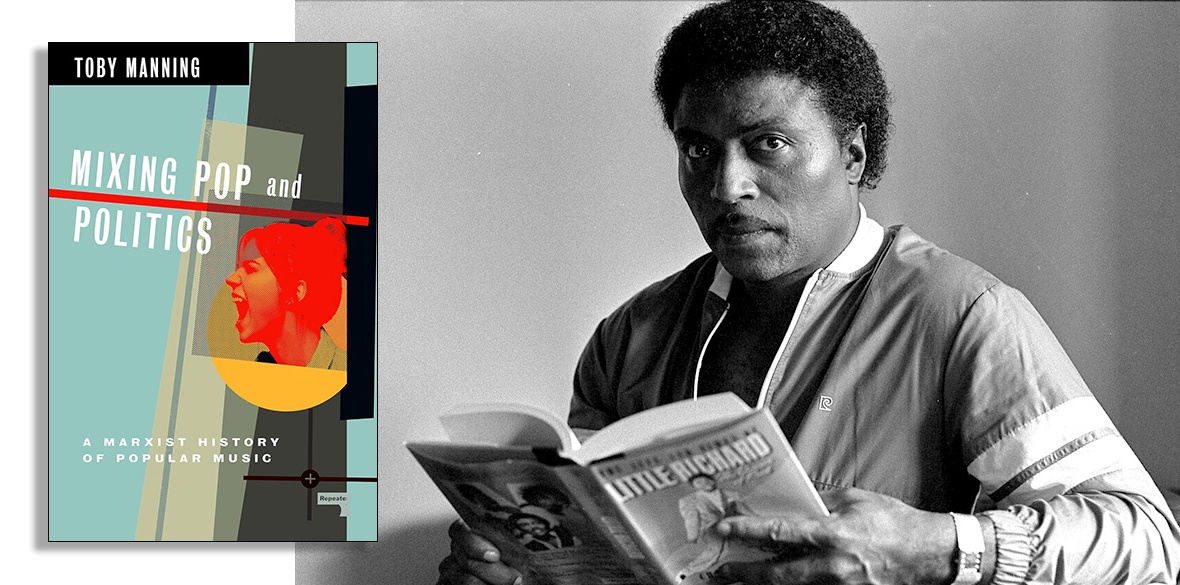This is the last article you can read this month
You can read more article this month
You can read more articles this month
Sorry your limit is up for this month
Reset on:
Please help support the Morning Star by subscribing here
WRITING in the Morning Star, Alistair Findley recommended this 565 page tome which “achieves the seemingly impossible by grounding high-level intellectual scholarship and theory within the popular culture of the day.”
So what initially inspired Manning to put pen to paper?
“I wrote the book after researching Marxist theory,” he says, “and I started to realise how much we skim over the surface of everything in the news and in our understanding of the world”.
Interestingly, Manning asserts that: “Rock and pop music were the unexpected consequences of the working-class entering history.
“In the US all of its practitioners were either poor whites or African-Americans from the disadvantaged South, so rock and roll sounded like a crude assault on the mores of established society.
“Thus, we have Sixteen Tons sung by Tennessee Ernie Ford about a coal miner rejecting the authority of his bosses in 1956; Eddie Cochran turning his back on the Protestant work ethic in 1958’s Summertime Blues; and in 1957 we have Little Richard telling his fans to ‘Rip It Up’, rip up the entire playbook and just live for the weekend.”

And how did the Establishment react to this newfangled thing called rock and roll?
“Genteel post-war balladry by the likes of Patti Page and Doris Day dominated the airwaves at the time, so law enforcers just simply tried to ban it,” Manning continues. “Radio stations refused to play it, and record labels got white middle-of-the-road crooners to record cover versions in an attempt to tame it.
“When these strategies failed the authorities moved in and finally got their way via accusations of payola.”
Payola is the dubious practice of bribing radio stations and/or DJs to play certain songs on the radio in an attempt to turn them into profitable hits.
“But this was the only way these small independent labels could get their records heard in a market stitched up by the big labels and publishing houses,” Manning contends. “The subsequent court hearings resulted in people losing their jobs, and all sorts of convictions, the most famous being the indictment of the DJ Alan Freed.”
And what about racial segregation in the music industry during the 1950s?
“There were clear lines. Whether they were railway tracks, coloured bars, lines down the middle of the auditoriums, drinking fountains, and all the rest of it. And there was a separate black music chart too, but it had cross-overs.”
Cross-overs?
“So when Little Richard started getting traction in the black charts with, say, Tutti Frutti or Long Tall Sally, he was immediately sabotaged by Pat Boone and a whiter than white Christian cover version which the label pushed in order to sell more copies.
“And although Chuck Berry had disgraced himself personally, I don’t think that’s the real reason why he’s been written out of rock and roll history. I mean, he wrote all of his own songs, invented his own guitar style, and created a whole genre of riffs which classic heavy rock still uses today.
“But then you have movies like George Lucas’s American Graffiti in 1973 and Robert Zemeckis’s Back to the Future in 1985 which removed all the aggression and rebelliousness out of black rock and roll, turning it into a white suburban phenomenon.
“So, yeah, I would say that all this occurred because of institutional racism.”
The book covers a huge amount of much ground, and the first two chapters scrutinise the 1950s through the critical lens of Fordism.
“Fordism is the mechanism of mass production and consumption which defined the first two-thirds of the 20th century,” Manning explains. “It’s a factory model which a record label like, say, Motown is built around.
“What’s often overlooked, however, is that Henry Ford introduced a corporate welfare system in his automobile plants where he reduced working hours and increased wages in the wake of the Russian Revolution in 1917.”
And, musically, how did the 1950s end, and how did the 1960s begin?
“Repressed due to a reassertion of conservatism and patriarchy. Mournful, yearning songs like The Everley Brothers’ All I Have To Do Is Dream from 1958 and Roy Orbison’s In Dreams in 1963 typified a mood of melancholia, alienation and restlessness.
“We must remember, however, that dreams also informed the political utopianism of the black civil rights movement at that time, and a track like Sam Cooke’s A Change Is Gonna Come
was directly inspired by Martin Luther King’s “I Have a Dream” speech in 1963.”
Mixing Pop and Politics: A Marxist History of Popular Music is published by Repeater Books
The full interview with Toby Manning is available on Spotify and Youtube
Brett Gregory is a film-maker based in Greater Manchester who also interviews film/media academics and authors for his podcast, Serious Feather Arts










